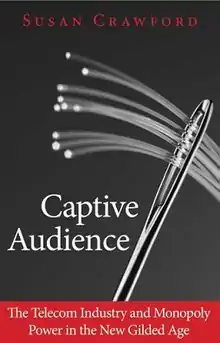 | |
| Author | Susan P. Crawford |
|---|---|
| Genre | Non-fiction |
| Publisher | Yale University Press |
Publication date | 2013 |
| Pages | 360 pp. |
| ISBN | 978-0300153132 |
Captive Audience: The Telecom Industry and Monopoly Power in the New Gilded Age[1] is an American non-fiction book by the legal expert Susan P. Crawford.[2]
Summary
It describes high-speed internet access in the United States as essential (like electricity) but currently too slow and too expensive. To enable widespread quality of life and to ensure national competitiveness "most Americans should have access to reasonably priced 1-Gb symmetric fiber-to-the-home networks."[2] Crawford explains why the United States should revise national policy to increase competition in a market currently dominated by Comcast, Verizon Communications, AT&T, and Time Warner Cable.[3] Meanwhile, towns and cities should consider setting up local networks after the example of pioneers such as Lafayette, Louisiana's LUSFiber and Chattanooga, Tennessee's EPB.
See also
References
- ↑ JSTOR
- 1 2 Susan P. Crawford (2013), Captive Audience, New Haven: Yale University Press, OL 25356276M
- ↑ Paul Krugman (February 16, 2014), "Barons of Broadband", New York Times, retrieved February 17, 2014
Further reading
- Cecilia Kang (March 2, 2013). "Controversial activist takes on the telecom industry". Washington Post.
- Brian X. Chen (February 19, 2013). "One on One: Susan P. Crawford, Author of 'Captive Audience'". New York Times.
- Sam Gustin (January 9, 2013). "Is Broadband Internet Access a Public Utility?". Time.
- John B. Judis (April 30, 2013). "The Next Elizabeth Warren". New Republic.